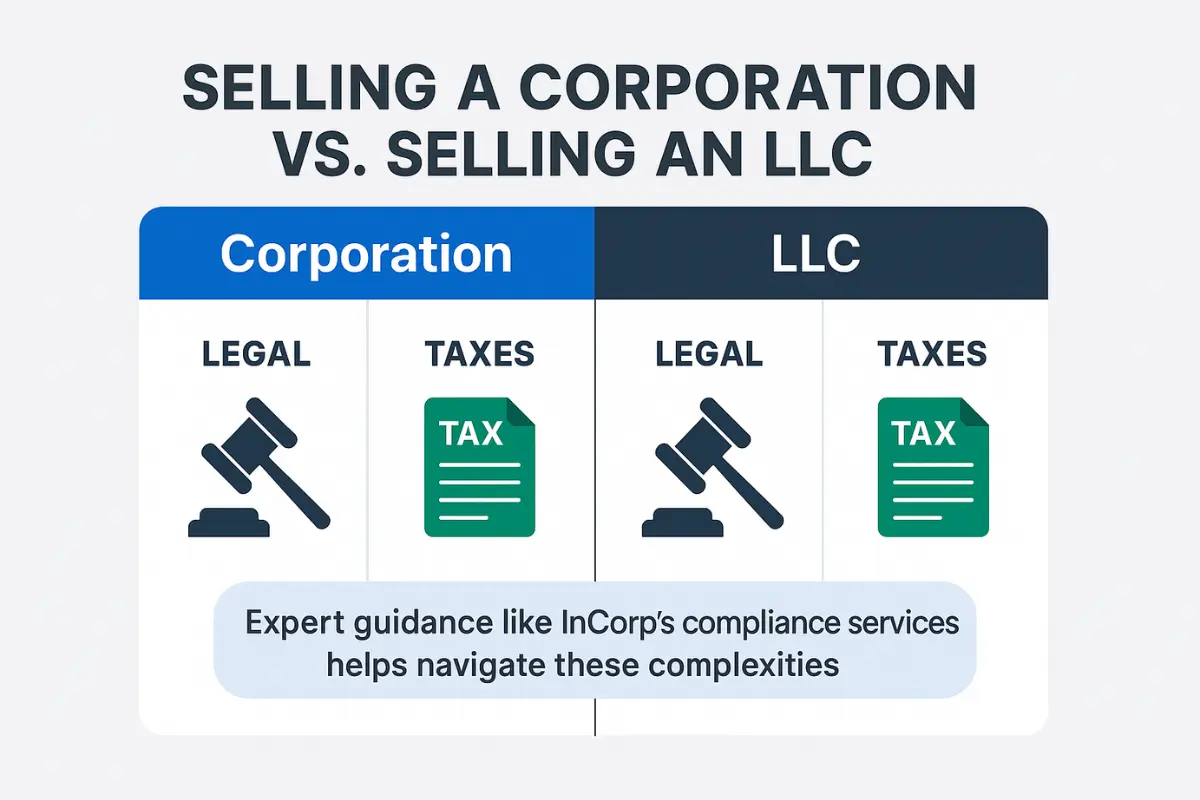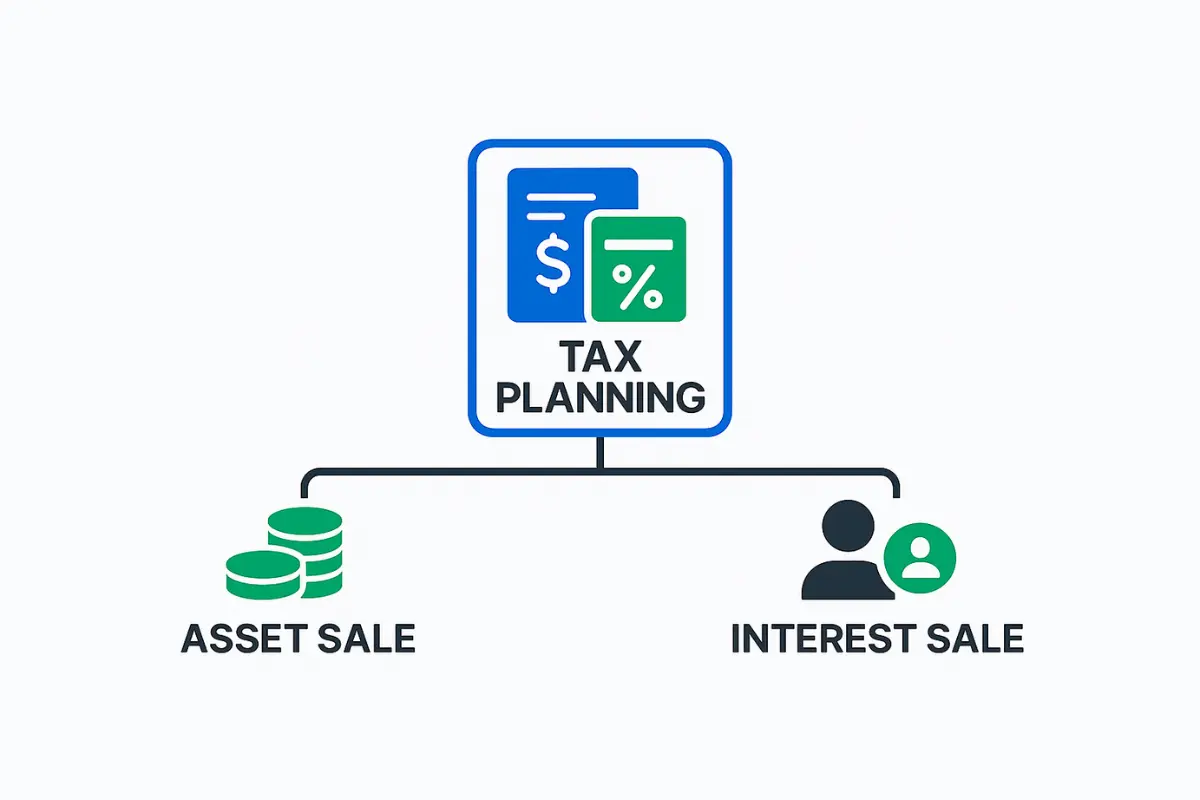Selling a Corporation vs. Selling an LLC: Legal Differences to Know

Nearly every entrepreneur imagines maximizing their payout when they sell their business, but few realize that a single choice made at the very beginning—the decision to form an LLC or a corporation—can tip the scales for years to come.
Picture two founders who build equally successful companies. One chose an LLC as a business structure, the other a C-corporation. When it comes time to sell, their experiences diverge: the LLC offers tax flexibility and simpler documentation, but potential hurdles in ownership transfer and buyer confidence. The C-corp offers easier access to capital and standardized processes for share transfers, yet double taxation on asset sales and stricter corporate formalities loom large.
Knowing how your initial entity choice shapes the sale process, tax outcome, and seller liabilities lets you plan for success instead of costly surprises. This guide compares the most important legal distinctions between selling a corporation and selling an LLC, helping you understand how formation impacts your business’s future—and your eventual payday.

Key Takeaways
-
Entity selection at formation has long-term impact. The choice between Limited Liability Company and corporation shapes how easily, efficiently, and profitably a business can be sold years later.
-
Ownership transfer processes differ. LLC sales typically require member approval outlined in the operating agreement, while corporations transfer ownership through stock, often appealing to institutional buyers.
-
Approval requirements and documentation matter. Corporations require formal board and shareholder approvals with extensive record-keeping, while LLCs rely on flexible procedures based on their operating agreement.
-
Tax consequences are significant. C-Corps face double taxation on asset sales, while S-Corps and LLCs typically avoid this with pass-through tax treatment, affecting both negotiation and net proceeds.
-
Liabilities transfer differently. In stock/interest sales, buyers inherit all historical liabilities; in asset sales, sellers generally retain liabilities and buyers get a clean start.
-
Indemnification is critical protection. Regardless of entity or sale structure, indemnification clauses in purchase agreements protect buyers from undisclosed pre-sale issues, with sellers remaining liable for a negotiated period after closing.
-
Meticulous records preparation is essential. Updated filings, good standing certificates, and intellectual property protections help business owners avoid delays or deal complications during the sale process.
-
Align business structure and exit goals. C-Corps may offer the best path for stock sale tax efficiency for strategic buyers, while LLCs provide flexibility and tax simplicity for operational owners or those anticipating asset sales.
-
Professional guidance is advised. Given the complexity and far-reaching effects of sale structure and entity type, ongoing consultation with legal and financial advisors is key to maximizing business sale outcomes.
Key Differences in Selling a Business Entity
The process of selling an LLC vs a corporation is not a one-size-fits-all endeavor. The business structure dictates a different framework for transferring ownership, obtaining approvals, and handling taxes. The following table outlines the core differences when selling the entire business, contrasting an LLC with a C-Corporation (C-Corp), which has the starkest legal and tax differences.
Note: This table uses a C-Corp for comparison. S-Corporations (S-Corps) are discussed in detail below, as they are legally corporations but taxed differently.
| Feature | Limited Liability Company (LLC) | Corporation (C-Corp ) |
|---|---|---|
| Ownership Transfer | Transfer typically needs member approval per the Operating Agreement. | Ownership changes hands through stock shares. |
| Approval Process | Governed by the Operating agreement; may require member consent. | Requires formal approval from the Board of Directors and Shareholders. |
| Tax Treatment When Selling | Single taxation on sale: Members pay tax on their profit when selling ownership interests or assets. | Stock Sale: Shareholders pay capital gains tax (single tax). Asset Sale: Double taxation (corporation pays tax, then shareholders are taxed again on distributions). |
| Key Documents | Membership Interest Purchase Agreement; Amendment to Operating Agreement. | Stock Purchase Agreement; Board of Directors resolutions. |
| Liability for Seller | Asset Sale: Liabilities are generally retained by the seller's entity. Interest Sale: The buyer assumes the entity and all its historical liabilities. |
Stock Sale: The corporation retains all historical liabilities, which transfer to the buyer. Asset Sale: Liabilities are generally retained by the seller's entity. |
While this table summarizes the core concepts, a deeper look into each area reveals critical details for business owners.
Legal Structure & Ownership Transfer
The way ownership is defined and transferred varies significantly between entity types.
The Corporate Stock Sale (C-Corp & S-Corp)
In a corporation (both C-Corp and S-Corp), ownership transfers through shares of stock. The process involves endorsing stock certificates, updating the corporate stock ledger, and recording the new ownership. This standardized framework appeals to many buyers.
The LLC Membership Interest Transfer
In an LLC, ownership transfers through membership interests, with the process governed by the company's operating agreement. This document dictates member consent requirements, rights of first refusal, and transfer procedures. This flexibility can mean additional due diligence for buyers, who must review the agreement carefully.
Approval & Governance Requirements
The path to obtaining approval for the sale is another key area of divergence.
Corporate Formalities (C-Corp & S-Corp)
Corporations operate with a formal hierarchy. A sale requires a resolution from the Board of Directors and, typically, a vote of the Shareholders. This process relies on meticulous corporate records (meeting minutes, resolutions) to prove the sale was properly authorized.
LLC Flexibility
LLCs are governed by their Operating Agreement. It dictates the required approvals—whether unanimous consent, a simple majority, or another threshold. If no agreement exists, default state rules apply, which may not align with the members' intentions.
Transaction Types & Documentation
Asset Sale vs. Stock Sale/Membership Interest Sale
In a business sale, the structure of the deal is a critical choice that affects both parties.

Stock/Membership Interest Sale
The buyer purchases the ownership of the entire entity (corporation shares or LLC membership interests). The buyer inherits the business and all its historical liabilities, while the seller can often achieve a cleaner exit.
Asset Sale
The buyer purchases specific business assets (equipment, IP, client lists), not the legal entity itself. The seller's entity retains its liabilities, and the buyer gets a "clean slate" free from past legal risks. Buyers often prefer this structure to minimize risk.
Key Documents Involved
The paperwork legitimizes the sale and protects both parties.
Corporation Sale Documents
Stock Purchase Agreement, Board of Directors Resolutions, and an updated Stock Ledger.
LLC Sale Documents
Membership Interest Purchase Agreement and an Amendment to the Operating Agreement to reflect the new member.
These documents must be maintained to prove the validity of the sale for years to come.
Tax Implications When Selling Your Business
This is the most critical distinction. How your sale is taxed depends on your entity type and the sale structure.
LLC Sale Taxation (Pass-Through)
An LLC is typically a pass-through entity. Tax is paid only once, by the members.
-
Membership Interest Sale: Members typically pay capital gains rates on profits. However, portions of the gain attributable to certain assets (like inventory or depreciation recapture) can be "looked through" and taxed at higher ordinary income rates.
-
Asset Sale: The tax "passes through" directly to members, who pay once on their share of gains. The character of each asset sold determines the tax rate (some capital gains, some ordinary income).
Corporation Sale Taxation
This is where C-Corps and S-Corps are completely different
C-Corporation Sale Taxation
-
Stock Sale (Seller's Preference): Shareholders sell their stock and pay one layer of tax (capital gains) on their profit. This is highly tax-efficient for the seller.
-
Asset Sale (Buyer's Preference): This triggers disastrous double taxation.
-
First Tax: The C-Corporation pays corporate tax (e.g., 21%) on the gains from selling its assets.
-
Second Tax: When the remaining proceeds are distributed to shareholders, the shareholders pay tax again (as dividends or capital gains) on that money.
-
S-Corporation Sale Taxation (Pass-Through)
An S-Corp is a corporation legally, but it's a pass-through entity for tax (like an LLC). It avoids double taxation.
-
Stock Sale (Seller's Preference): Shareholders sell their stock and pay one layer of tax (capital gains). This is a clean, tax-efficient exit.
-
Asset Sale (Buyer's Preference): The S-Corp avoids double taxation. The gain on the asset sale "passes through" to the shareholders, who pay one layer of tax. However, just like an LLC asset sale, the sale of certain assets (inventory, receivables, depreciation recapture) will be taxed at higher ordinary income rates.
The Negotiation Reality
-
C-Corp Seller vs. Buyer: This is the biggest conflict. The seller must have a stock sale. The buyer wants an asset sale. The tax difference can be millions of dollars.
-
S-Corp/LLC Seller vs. Buyer: The conflict is smaller. Both sides face only one layer of tax. The negotiation focuses on who pays the higher ordinary income tax rates on certain assets (the seller in an asset sale) versus the clean capital gains (the seller in a stock/interest sale).
What This Means for Initial Entity Selection
Business owners planning for an eventual sale face a strategic consideration: C-Corps offer the most tax-efficient exit through stock sales, potentially saving hundreds of thousands or even millions in taxes compared to other structures. This advantage becomes particularly compelling for businesses likely to attract institutional buyers, private equity, or strategic acquirers who are comfortable with stock purchases.
However, this exit strategy benefit comes with ongoing costs. C-Corps face double taxation on regular operations through corporate taxes and dividend taxation. For businesses expecting to distribute profits regularly before a sale, or those planning to hold the business long-term, the accumulated tax burden of C-Corp structure might outweigh the eventual exit benefits.
LLCs provide more flexibility during ownership but may result in some ordinary income treatment upon sale. They work well for businesses that want operational tax efficiency, expect to distribute profits regularly to owners, or anticipate buyer preferences for asset purchases—common in smaller transactions or when buyers want specific assets rather than entire companies.
The key is aligning structure with your timeline and exit goals. Businesses targeting a sale within 5-7 years to sophisticated buyers might prioritize the C-Corp's stock sale advantages. Those with longer horizons, uncertain exit timelines, or different succession plans might favor the LLC's operational flexibility and single taxation during the holding period. Many businesses also start as LLCs and convert to C-Corps closer to a planned exit event, though this conversion itself has tax implications worth considering with professional advisors.
Legal Fact vs. Practical Reality
-
Stock/Interest Sale: The buyer legally inherits the entity's entire history, including all known and unknown liabilities.
-
Asset Sale: The buyer legally purchases only the assets, leaving liabilities (like old lawsuits or debts) with the seller's original entity.
In every private business sale (stock, asset, or interest), the seller's legal protection is not the sale structure itself, but the indemnification clauses in the purchase agreement. Indemnification, as defined by the Legal Information Institute at Cornell Law School, means compensating a person for damages or losses they have incurred or will incur related to a specified accident, incident, or event. Indemnification is a contractual promise from the seller to reimburse the buyer for losses incurred after the sale that relate to pre-closing issues. This includes breaches of representations (e.g., "all financial statements are accurate") or undisclosed liabilities. For further reference, see the Legal Information Institute’s definition of indemnification
Sellers are never "free and clear" at closing. They remain on the hook for a negotiated period (the "survival period," often 12-24 months) and up to a certain dollar amount (the "cap"), protecting the buyer from unknown risks.
Preparing Your Business Entity for a Sale
Selling a business requires meticulous preparation, and a key part of that is getting your entity's records and state standings in order. Foundational administrative tasks often need to be addressed before a sale, such as:
-
Updating state records by filing Articles of Amendment to reflect any changes in company leadership or structure.
-
Securing intellectual property through trademark registration.
-
Obtaining a Certificate of Good Standing to prove the entity is compliant with state requirements.
-
Handling Foreign Qualification for any states where the business operates but is not formally registered.
-
Performing UCC Searches to reveal any existing liens on company assets during the due diligence phase.
Getting your paperwork in order from the start keeps negotiations focused on deal value and terms—not on compliance gaps or last-minute surprises. If you want confidence through every stage of your transaction, let InCorp assist with your filing and documentation needs so you’re prepared when buyers review your corporate records.
Conclusion & Next Steps
The path to a successful business sale is paved years in advance by your choice of entity, as highlighted in the U.S. Small Business Administration’s Choose a Business Structure and whether you elect S-Corp status. Whether you elect S-Corp status or another structure, selling a C-Corp involves significant tax considerations, while selling an S-Corp or LLC offers more flexibility but requires careful tax planning for complex “look-through” rules. In all cases, understanding approval requirements, modeling tax outcomes for every sale type, and maintaining meticulous documentation are key to surviving due diligence and the indemnification period.
FAQs
Can you sell an LLC the same way you sell a corporation?
Not exactly. LLCs transfer membership interests, a process governed by the operating agreement. Corporations transfer shares of stock, which is a more standardized process. LLC sales often require consent from other members, making them less uniform.
Which is easier to sell: a corporation or an LLC?
Corporations are often structurally more familiar to buyers and investors because shares are standardized. However, the "easier" option ultimately depends on having clear, well-drafted governing documents for either entity type.
What documents are required to sell a business?
For a corporation, key documents include a Stock Purchase Agreement and board resolutions. For an LLC, you typically need a Membership Interest Purchase Agreement and an amendment to the operating agreement. Both require meticulous corporate records.
How are taxes handled when selling an LLC?
LLC sales are generally pass-through events. The gains from the sale are allocated to the members based on their ownership percentage and reported on their personal tax returns, where they are subject to capital gains tax.
How does business structure affect personal liability when selling a corporation or LLC?
Business structure directly impacts liability protection for owners. Limited liability company (LLC) members and corporate shareholders (whether in an S corporation or C corporation) are generally shielded from business debts or legal claims, so personal assets are not at risk when the entity is sold, unless they have provided personal guarantees or committed fraud.
Can you sell your corporate stock or LLC membership interests to foreign individuals?
Corporations—especially C corps—can sell stock to foreign investors, making them attractive for raising capital globally. LLC membership interests can also be transferred to foreign individuals, though S corporation status prohibits nonresident shareholders under U.S. Internal Revenue Code regulations.
What role does the LLC operating agreement play in the ownership transfer process?
An LLC operating agreement sets out the terms for transferring membership interests, including consent, valuation, and rights of first refusal. If absent or incomplete, state LLC laws govern the process, which may not align with business owners' preferences, making a strong operating agreement essential for a smooth sale and clear documentation.
What are the implications for self-employment taxes after selling an LLC?
LLC owners may owe self-employment taxes on certain portions of gain realized from the sale, especially if the LLC is taxed as a sole proprietorship or partnership. Pass-through entity taxation means members report business income on their personal tax returns and pay self-employment and income taxes as required by law.
How does double taxation impact C corporation owners in a business sale?
Double taxation occurs in a C corporation business sale—especially with an asset sale—because the corporation pays income tax on gains first, and shareholders pay personal tax again when those gains are distributed as dividends. This is a key difference that business owners consider when structuring the business and its eventual sale.
What documents prove legal ownership transfer in an LLC or corporation sale?
For an LLC, the Membership Interest Purchase Agreement, updated LLC operating agreement, and amended Articles of Organization are required. For a corporation (C corp or S corp), a Stock Purchase Agreement, board resolutions, and an updated stock ledger confirm the transfer of ownership stake.
How do you raise funds or capital before a business sale, and does entity type matter?
C corporations are often preferred by venture capitalists and financial institutions because shares are easy to transfer and attract investors globally. LLC structure offers flexibility in profit distribution but is less familiar to investors and may restrict raising capital unless converted to a corporate structure.
Does an S corp election affect tax implications or the sale process?
S corp election allows for pass-through taxation, avoiding double taxation faced by C corps. S corp status affects who can own shares and may restrict sale to certain buyers. S corps must also file annual reports and maintain strict compliance to preserve their advantageous tax status.
Are there differences between selling a traditional legal entity and a tax-exempt or nonprofit corporation?
Nonprofit corporations have strict rules against distributing corporate profits to owners. Selling a business with tax-exempt status requires compliance with local secretary of state and IRS requirements, and differs substantially from the sale of for-profit LLCs and corporations.
Can a business owner with a sole proprietorship get limited liability protection, and how does sale differ?
Sole proprietors are held personally liable for all business obligations and cannot sell stock or membership interests—most often, they can only sell the business assets. They do not benefit from the liability protection offered by LLCs or corporations, making proper entity selection crucial for risk management and sale flexibility.
Share This Article:
Stay in the know!
Join our newsletter for special offers.